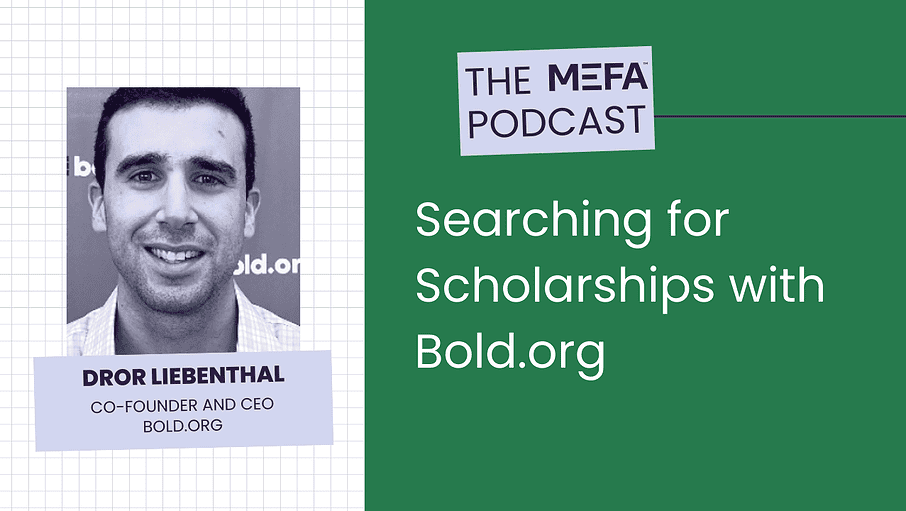Resources Mentioned in this Episode
Please note that this transcript was auto-generated. We apologize for any minor errors in spelling or grammar.
Jonathan Hughes: Welcome to the MEFA podcast. My name is Jonathan Hughes
Julie Shields-Rutyna: And my name is Julie Shields-Rutyna.
Jonathan Hughes: And today this is going to be a really exciting show because everybody wants to know about scholarships. And we are going to be talking to Dror Liebenthal, who is the co-founder and CEO of bold.org, which is a scholarship search engine that people ask us about all the time.
Actually, they ask us specifically about bold.org. So I know there’s a lot of interests about it. So you want to stick around and listen to that conversation. But first we have some news regarding COVID and colleges in Massachusetts this fall.
Julie Shields-Rutyna: Well, we do. So last week, the presidents of the nine state universities in Massachusetts announced that all returning students who are going to attend in-person classes next year will be required to be vaccinated against COVID 19.
So the state universities, just so people know what those are, are Bridgewater State, University, and also Fitchburg, Framingham, Salem, Westfield, Worcester State, Massachusetts College of Art and Design, Massachusetts College of Liberal Arts, and the Massachusetts Maritime Academy. Now, as far as UMass, UMass Boston and UMass Amherst are also requiring vaccination for students taking in-person classes.
UMass Lowell and UMass Dartmouth currently are not, but they still are encouraging students to do so. So there are going to be people with a lot of different feelings about this. We already know that there are, but let’s just talk about a few things. This is a requirement only for students attending in-person classes.
So there will still be some remote learning options. So students could take advantage of that if they weren’t comfortable with this. And, yeah, so I guess that’s important to know.
Jonathan Hughes: Yeah. So this is big news. And so, you know, I saw this on the news last week. Are these the first colleges in Massachusetts to do this, to make this kind of requirement?
Julie Shields-Rutyna: Well, no, there are actually some private colleges who’ve made similar announcements. Now we may not know of all, because I think every day colleges are making new decisions, but right now we do know Boston College, Boston University, Emerson College, Northeastern University, and Smith College have also made similar requirements.
Jonathan Hughes: Hmm. And why would they make this type of requirement?
Julie Shields-Rutyna: Yeah, well, I guess, you know, so one thing we heard Boston University president Robert Brown say is that our goal is to move to a new normal kind of in quotes. Which would include minimal social distancing, so they want facilities to be open.
They want students to be able to move frequently between residences. They want guests to be able to come to campus and to be able to do all of that. The vaccination is really necessary.
Jonathan Hughes: And what about students who maybe didn’t have access to the vaccine arriving on campus?
Julie Shields-Rutyna: Yeah. Actually colleges are doing everything they can to vaccinate students on campus.
So I think the availability of being able to be vaccinated is higher right now. And it’s going to only increase. So they know that if they need to make that requirement, they need to also be able to provide vaccines for students.
Jonathan Hughes: Okay. Now, Julie, this seems like new territory, but how different really is this for colleges?
Julie Shields-Rutyna: Well, actually the truth is it’s important to remember that college students are already required to be immunized for a variety of illnesses. So before your child starts college, they need to supply their medical records, detailing that they have their measles, mumps, rubella vaccination, for example.
So this is just going to be added to the list of those required immunizations.
Jonathan Hughes: And if students or parents have any questions about this, who should they contact?
Julie Shields-Rutyna: Yeah, so they should definitely reach out to a specific college. Probably the admissions office is a good place to start.
Jonathan Hughes: All right, Julie. Well, thank you very much.
We’re going to be hearing more about that. This I’m sure as colleges sort of release their plans for the upcoming year in the fall. Now we’re going to head over to the MFA mailbag, and these are questions that have come in from customers over the past two weeks and answered by guidance experts.
If you have any questions, please reach out to us at [email protected] or call us at 1-800-449-MEFA. Oh, you can reach us on social media, on Facebook and Twitter, at @mefatweets. That’s our Twitter handle. So our question this week comes to us from Tessa, great name, and she writes I’m writing to you because I was wondering how student loans work with off campus housing.
I’m hoping to live in an apartment. This falls, my school doesn’t have guaranteed housing. I was wondering if it’s possible to add into my loan amounts, some of the cost of living in an apartment for school. I want to know if this is possible and if it is, if there is a limit can be taken out for that.
Okay. It’s a very popular question. Julie, do you want to take a run at it?
Julie Shields-Rutyna: Yes. Well, I like this question because it sort of touches upon some financial aid principles. So one of those is that students apply for financial aid and can receive financial aid for the whole cost of attendance to be enrolled at a college.
So that whole cost of attendance is tuition, fees, room and board, books and supplies, and other required expenses. So if all of those expenses are part of that cost of attendance, then students can use their financial aid, can receive financial aid, and can use financial aid to pay for any of those expenses.
And so room and board could also be translated into housing and food. And that’s absolutely fine. And then the other, I guess the other principle is that financial aid is usually grants, scholarships, work, study, and student loans. And so all of that financial aid, including the student loans, can be used to pay for off campus housing, as well as food cost.
Now, you might Tessa might ask, you know, so, it’s easier when there’s a dorm and a meal plan to know the exact cost. So what about an off-campus apartment? So your college will have an amount that can be used for off-campus housing. And so there’s an amount that they have in their cost of attendance for off campus housing for room and board.
So you would just want to double check with your college on what that amount is. And colleges usually try to make that amount be inline with housing costs in the area.
Jonathan Hughes: Thanks Julie. One thing I would add to that too, for Tessa is if you’re going to be borrowing a MEFA lone, and I assume this is the case for most lenders as well, but I know for a fact that’s true for MEFA, we can only send funds directly to the college.
So, you know, if you’re wondering about how you’re going to get that money so that you can pay rent, et cetera. You just have to deal with the financial aid office at the college for that. And that’s another principle, not necessarily of financial aid, but one that we talk about a lot in our financial aid presentations, which is keep in touch with the financial aid office and don’t be afraid to do that. So thank you so much, Tessa. Thank you Julie. And remember if you have a question you can reach out to us. I’ll say it again at 1-800-449-MEFA over the phone or at [email protected] over email and on social media on Facebook and on Twitter at @mefatweets.
Now let’s go to my conversation with CEO and co-founder of bold.org Dror Liebenthal.
Already been thought of as the co-founder and CEO of bold.org, an innovative, streamlined, and secure service that matches students to exclusive scholarships. He joins us today to discuss what makes bold.org. so different. Dror, thanks for joining me.
Dror Liebenthal: Hey, Jonathan. Thanks for having me, pleasure to be here.
Jonathan Hughes: Sure. Can you tell us a little bit about bold.org and again, what it is that makes it so different from other scholarship programs?
Dror Liebenthal: Yeah, happy to. So our mission as an organization is to fight student debt. And we are a two-sided platform for students and donors. And what we do is we work with students to help them create profiles that showcase their expertise and background and career goals and educational goals.
And so really to put their best foot forward. For sure. Scholarship panel of schools, et cetera. And then we work with donors. So that’s anybody in any company and have a platform in place that’s a customized philanthropy solution. Basically allows anybody in any company to easily create customized scholarships, fellowships, and grants in minutes targeting on the exact groups of folks that they want to support.
And so it’s very personalized. It’s very high impact. A hundred percent of donated funds go directly to students. We’ve seen great traction and feedback so far on both sides. You asked a little bit there, as far as how it’s different from other scholarship platforms, and what I think is common in the scholarship space is an approach that’s more along the lines of like an aggregator or listing site for scholarships. So they, a platform that will provide students like a centralized source of here are millions of different scholarships from all over the internet that you can go check out.
And I think that kind of thing can be useful for students if they’re just kind of trying to understand everything that’s out there, but our approach is working directly with both sides working directly with donors in particular to bring as many new scholarships to students as possible.
So every scholarship on bold.org is managed through the platform. And so we accept the donation through the platform, award the scholarship through the platform, and it can only be found and can only be applied to on the platform. And so the goal is, you know, increasing the size of the pie of available funding for students.
And, at this point we’re publishing new scholarships on just about a daily basis.
Jonathan Hughes: And these are scholarships that can only be found on bold.org. Is that right?
Dror Liebenthal: That’s right. Yeah. So it’s a scholarship where we’ve worked directly with the donor and, you know, they’ve made the scholarship donation.
We’re holding the funds in escrow. And so we know that this scholarship is great. It’s real, we’re awarding it through the platform. And, you know, here are the exact criteria, and we’ll also announce it through the platform and keep students posted in a very transparent way about the scholarship that way.
Jonathan Hughes: And so can you tell me how the process works then for students? So someone who’s interested in searching for scholarships on bold.org, what would they need to do?
Dror Liebenthal: Yeah. So we try to design this to be as streamlined as possible for students. And we try to keep the student experience front and center in everything that we do.
And so the ways that we do that are we hire a lot of students onto our team and we try to use our interview very heavily with students before we build anything. And as we did that, as we went through a process of doing that, one of the consistent pieces of feedback that we got is that scholarship applications can often be kind of clunky and repetitive, where if you put them on full scholarships, you’re typically like answering the same questions over and over again. So we wanted to, and it’s gonna be difficult to differentiate yourself as well. So we wanted to address that by streamlining the process. So when a student wants to apply to scholarship on bold.org, step number one is they create their profile.
And this is an upfront investment of showcasing your background, your skills, your expertise, your extracurricular, the fact that you were a captain on the varsity basketball team, the fact that you won an award for an arts program, or know whatever the case may be. So really showcasing your educational backgrounds and strength, and then your goals as well.
So I want to major in chemical and biological engineering, or I’d like to, I don’t know, find a career in the nonprofit world focused on social impact work or whatever the case may be. So step number one is really creating that profile that helps you put your best foot forward and give scholarship panels an idea of, you know, here’s who I am and where I’m at and what I’m trying to accomplish.
And then at that point, once you’ve done the upfront work, it’s very streamlined where your profile, it gets packaged along with your application for every scholarship that you apply to. And so really your, you know, number of scholarships on the platform that are no essays. So they’re really awarded based on the strength of your profile relative to the scholarship criteria.
And then we have others that are essay based or image-based, you have some arts related portfolio based scholarships and ones that have creative submissions like that. But you’ll never be answering the same questions twice, which is really important. And it’s all very streamlined through the same user experience where it’s only the same site. You can apply in one place, see all of your in progress and submitted applications in one place, view the status of your submitted applications in one place, and so on. So that’s been our approach to user experience there.
Jonathan Hughes: So, this is like, let’s say you’re applying to three scholarships, you fill out your profile, you submit the answers to the questions or whatever it may be that applied to those three different scholarships.
At this point, then you’re submitted, what happens at this point? Is it like a portal? I’m gathering that you’d go back in and you check on your status.
Dror Liebenthal: Exactly. Yeah. So as you apply to scholarships, big challenge here frequently is that students will apply to scholarships and it’ll kind of like go into the ether.
Like they don’t, it’s difficult for a student to tell what happened to the application, whether it was reviewed, when it was reviewed, and so on, who won the scholarship, if a winner was actually named and so on. That came up repeatedly and still does every time we talk to students about this.
And so we try to index very heavily on transparency and organization ease of use. And so on the bold.org platform, students will have a my application dash board that’ll show you your applications that are in draft, so that you’ve started, but maybe haven’t completed, the ones you’ve submitted, the ones that you’ve been named a finalist for, the ones that you’ve won.
And then the ones that have been awarded, but that you haven’t won. And we’ll also sort of practically notify you at a bunch of different stages. So basically, say if you’ve submitted an application and the scholarship panel is reading your application, we’ll actually notify you that the scholarship panelists team is look at your application right now.
Yeah. And so, you know, maybe if you’ve added more experiences to add to your profile. In the meantime, since you submit your application, you should add that now because they’re actively reading your applications. So we’ll give applicants that notification, we’ll also, as an application deadline is coming up for a draft that you’ve started, we’ll notify you to get your draft completed and over the finish line.
And when scholarship’s going to review, we’ll notify you there as well. And then when finalists are awarded, we’ll notify you there too. So it’s really kind of, the goal is signposting at every step where you always know the status of your application and as winners get awarded, you’ll see that too and be notified there.
And then, you know, I’m not based if you didn’t win a scholarship. We give winners and finalists the option to share their application openly, and the vast majority of them do. And so you actually have the opportunity to look at what the winning application was and what the winning profile was, and sort of what excellence looks like, what a winning combination there looks like.
And so you can use that to adapt as you continue your pursuit of scholarships.
Jonathan Hughes: Do you see, you know, scholarship applications from various age levels?
Dror Liebenthal: Definitely. Yeah. And it’s a great question. So it does skew more heavily towards high school seniors and college freshmen. But, I mean, it’s really across the board, so it starts at high school freshmen and we see quite a strong volume of high school freshmen, sophomores, and juniors in the platform as well, who are thinking very proactively about what their future holds and how they want to be sort of practical about that and wind themselves up for success in their education. And so we have opportunities specifically for those types of students as well, but we see really strong applications coming from younger folks too.
And we also have some older students too, as far as like people later on in college and even recent graduates or sort of adult learners, people considering going back to school and grad school students is as well. So, you know, kind of across the educational journey and, you know, there’s lots of people that still have student debt after they graduated.
And so a lot of those types of folks on the platform too.
Jonathan Hughes: And so they can apply for scholarships to help them pay their student debt.
Dror Liebenthal: Yeah. Yeah. So we have some types of opportunities that are specifically for paying down student debt. So, you know, if you’re someone who’s graduated and you’re entering the workforce, you have say $30,000 of student debt.
We have opportunities where there’s a donor who wants to specifically support, you know, a student who’s graduated, has debt, and is getting off or looking to get off the grid, start in the workforce, and wants support.
Jonathan Hughes: One of the things that you say is your commitment to privacy and security.
And one of the things that we talk about when we’re just generally at MEFA, if I was speaking about scholarships and searching for scholarships, is that, you know, not every scholarship search engine is the same and that people certainly should never pay to have a scholarship search forums. Can you tell us and the people why this is important for applicants to know?
Dror Liebenthal: Yeah. So I would echo that for sure you shouldn’t be paying anything for any sort of scholarship search. Our philosophy here is the whole point of the platform is getting as many valuable resources in the hands of students as possible. So obviously it’s free for students.
And when we took a year and a half ago, and we were starting to pull that or took a look at the scholarship space, and I think what’s really, really common in the scholarship world is you you’ll have a database or sort of aggregator site. And to you as a student, you go in, sign up and you create an account to get access to this massive database listing.
But then as you sign up, sort of in the fine print, your information has now been passed and bought and sold to like dozens of different places. And this is, I think it leaves a lot to be desired. I mean, it leaves a lot to your desire from a student experience perspective.
And so we wanted to, and we saw a lot of opportunity for something that was way, way better. And so our approach is obviously it’s free for students. It was also important for us to make it free for donors in the sense that. A hundred percent of tax deductible donations go directly to scholarship recipients.
Some of that capital efficiency and direct it back. We’re a hundred cents on the dollar. If money you donate is going to somebody deserving. And so that was really important for us. So the way that we kind of keep the lights on and support the business and grow is we work really closely with students to understand who you are, where you’re at, where you’re trying to get you.
And then as relevant we use share basically optional partner opportunities, that are sort of siloed in like specific sections of the platform. And then only to the extent that a student’s like very front and center of like, hey, we think this might be relevant for you, whether that’s, you know, we see you have multiple student loans from a few different lenders that have different interest rates. Might be in your best interest to consolidate and refinance and sort of improve your situation. You’re trying to break into the tech industry. Here’s an industry leading newsletter. That’s really free that that actually helps cross those educational gaps and helps you kind of break in.
And it’s very front center of like, hey, is this relevant for you? Like, do you want us to refer you to this organization? And only to the extent that students say yes, then we’ll actually refer or refer our members. And we’ve found great feedback from our members for that, where the consistent theme that we get is that right.
Students want great products that help them get off to the best start possible in terms of education, finance, and career. They just want to know what those are and to be able to choose, actively opt in on whether it’s relevant or not for them. So that’s where they love this model. It allows us to keep both sides free and it allows us to sort of keep quality very, very high for students.
Jonathan Hughes: I was wondering if you could tell me if your, you know, what your education journey was and if your experience informed bold.org?
Dror Liebenthal: So my educational journey, I was originally born in Israel and moved to the U.S. when I was pretty young. And moved around to a few different schools, in the U.S. and then we ended up moving to Canada for a few years.
And so I actually went to high school in Winnipeg, Canada. And I was the first in my family to go to college in the U S. And so it was, and was also the oldest child in the family. And so navigating the U.S. admissions system for the first time. And I was at a school in Canada where I think I was the only person in my graduating class who ended up going to school in the U.S.
And so in terms of the infrastructure there and like a guidance counselor support, I was kind of on my own for most of that. And fumbling my way through the darkness, as far as like understanding how us college applications work, and so on. And so that was kind of one piece of it. And then on the scholarship side, scholarships that opened up some educational doors for me in meaningful ways growing up.
And so Dell, for example, got into this great private high school in Canada through a scholarship that wouldn’t have been able to go to otherwise. And so that was very important for me as a launching pad and a couple of other experiences like that. And so it was kind of that combination of the types of impact that a scholarship can have for a young person, not just in terms of financial support, but like, in my case, it was more like opening doors that weren’t previously open.
And then, also like having someone who’s a little bit further along in than you reaching out and saying like, you know, wording, your scholarship is like them saying we see you, like, you’re doing great. Keep going. Like this is, you know, you’re on the right path. So I think that that vote of confidence for young person can really mean a lot.
On the flip side as I started my career, I was able to run scholarships on behalf of a few different organizations and sort of saw the other side of the equation of why an organization might want to create a scholarship and what the challenges are around new operations, legal, finance of running scholarships.
And got like a firsthand view of maybe how to effective ways to solve that and how to really craft a platform that serves both donor and student and in effective ways.
Jonathan Hughes: We tend to serve families and students. We tend to be facing that, that ended up, but that’s, I think part of the reason why the other side of bold.org are so interesting to me, which is enabling individuals or organizations or companies to set up scholarships, and helping them to do that in an effective and easy way.
So, that was such a great idea. So I wanted to ask you, you know, as an organization, if I had an idea and I wanted to provide a scholarship and wanted to set that up, how is that done through bold.org?
Dror Liebenthal: Yeah. So, I mean, you sign up or reach out and work with a member of our donor team and say, you know, here’s what I want to contribute.
And let’s see if you want to make it a one-off or do you want to make it annual or twice a year? And here’s how many folks you want to award it to. And then here’s the type of student that I want to focus on. So that could be, you know, you could say, you know, I was an environmental engineer, but I ended up going into a different field.
And so I want to support, you know, the next grade environmental engineer who goes in and focuses on conservation or green tech or whatever the case may be like, that’s who I want. And they’ll say great. Or it could be, you know, I want to support, I don’t know, a student from an underrepresented or under supported background and like that’s exactly who I’d like to get applications from.
Also great. We’ll go out and create that scholarship and then share it on the platform with students who meet that criteria. And that’s where, again, the profile is really important where if you would just have structured down on this, where if you say, like I have these experiences, it’s a lot easier for us to say wonderful.
This scholarship actually is a great fit for your, for your experience. And so, you’ll get up from those folks. And then according to the scholarship criteria that the selection criteria that we lay out with you, that’s how the winner will be selected.
Jonathan Hughes: Now, can you tell me a bit about the reaction that has been generated from bold.org from both applicants and from donors who set up scholarships?
Dror Liebenthal: Yeah. Sure. A couple of things are so on the applicant side. I mean, it’s, this is what keeps us going day to day is the reactions we’re getting from winners.
And it’s, you know, it’s everything from students who are able to pursue dream careers, ways that they otherwise would not have been. Because now they’re not graduating with tens of thousands of dollars in debt and can actually think holistically about like where they want to go. Not just what will pay them the most immediately.
Two, students who, you know, we’ll call them and say, you’ve won the scholarship. And there would be like a moment of silence or like a pause and then like a, whoa, I’ve never won anything. Like this is this is amazing. And this was, I think that one was for a thousand dollars scholarship.
And it’s, I mean, the thousand dollars is impactful for sure, for the right person. But in the light of like how expensive colleges as a whole, like, it’s not always, they’re not necessarily like a life-changing amount of money. And so in this case, it was about someone who has not won a contest or something like this to date, like getting the recognition for a very deserving application and getting that vote of confidence from an organization or a donors whose thing is amazed by this person’s work.
So we get those types of reactions all the time. And I think the other sort of themes of feedback we get from students are a strong appreciation for scholarships around specific topics. And the ability to, you know, understand donors, backgrounds and, you know who they are and why they’re creating these scholarships and the fact that all of the scholarships are exclusive to the platform and that we’re very transparent about sharing status applications and finalists and winners and resources for students to improve and so on.
So that’s on the student side and on the donor side, you know, we crafted this way. There’s, a lot of evidence that people are more likely to donate for a lot of different things, but one is when it feels personal to them. So when the way in which they’re donating reflects their own experience.
And so that’s one, two is when they can see the direct impact of the money that they donate. And so that’s another, and then a third is just when user experiences is very smooth, when the actual experience itself is modern and seamless and great. So we’ve kind of tried to craft the platform to address those specific points.
And so, we get this feedback over and over again from donors where the fact that a hundred percent of their tax deductible donation is going directly to a deserving winner. It’s not going to administrative overhead. It’s not going to salaries. It’s not going to technical infrastructure costs and so on.
It’s going directly to a deserving individual. And so that capital efficiency is very motivating for donors. Others says, usually, or historically, if you want to engage in philanthropy, the two kind of paths are, if you’re extremely wealthy or have a lot of inner, a lot of dedication of a lot of time and energy to put towards this. Then people, that’s when people create their own foundations and hire staff to, you know, to customize their giving and so on and so forth.
But that takes a lot of work and a lot of capital and that’s, you know, not everybody can be the Bill and Melinda Gates Foundation and so on. So, that’s one end of the spectrum. The other end of the spectrum is for the vast majority of population that wants to engage in impact oriented work and donates to, you know, amazing, very, very deserving organizations, but it’s sort of generic.
Like, you know, you donate to a particular organization and it can be a little black box. You’re not sure exactly where your money’s going. But, you know, you hope and expect that it’s going to tell meaningful cosmic, it doesn’t feel necessarily as personal. You might get like a handwritten, thank you note in the mail in turn, but that’s kind of the extent of it.
We try to approach it with that middle ground of like, best of both worlds where it’s customize them the level of like, high-end like having your own personal foundation. But for everybody, for any company with very, very small, like $500 minimum capital commitment.
And so that type of customization is available to everybody. I mean, the goal of doing it that way is just to increase the size of the overall pie with a great experience that is personal, that is streamlined, that’s extremely capital efficient, that feels very impactful along the dimensions that you care about in your day to day life.
And is sort of unique to you. That’s the feedback that we’re getting from donors, as far as what they find valuable and what drives them to donate more.
Jonathan Hughes: As I said, scholarships are always a popular topic, but I know specifically that bold.org drives a lot of questions and people are very interested in it and I know that people talk to us about bold.org. Dror, I wish you the best of luck of course, with it and keep going. And I want to thank you for joining me here today and letting everybody know about how they can take advantage of that service.
Dror Liebenthal: Thanks, John, and thanks for having me, it was a pleasure answering the questions. Okay. Can I share my email? If anybody has feedback, questions, comments. I’d love to hear that. It’s just Dror, DROR, my first name, at apple.org. And would love to hear from you. So thank you.
Jonathan Hughes: All right. Well, that was show everybody. Remember if you liked the show, please subscribe on Spotify, Apple podcasts, wherever you’re hearing this.
And if you could do us an extra favor and give us a five-star rating, that would be greatly, greatly appreciated. Julie, thank you for joining me today. Thank you. Okay. Until next time. Thanks everyone.









